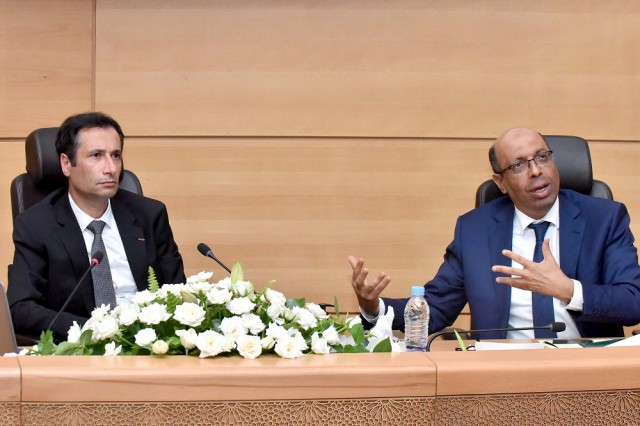The government of Morocco is set to begin working on the project of generalizing social security to cover all Moroccans on January 1, 2021, Minister of Economy Mohamed Benchaaboun announced.
The government will work on the project alongside that of job loss compensation, Benchaaboun said in a press conference on Tuesday, August 4.
During the conference, the minister of economy presented the measures the government is set to take in response to directives King Mohammed VI issued in his Throne Day speech.
Generalized social security in Morocco was one of the King’s main calls on July 29.
“I … believe the time has come to launch a decisive process for the expansion of social welfare coverage to all Moroccans within the next five years,” the monarch said.
“This project needs to be implemented gradually, as of January 2021, using a well thought-out plan, starting with compulsory health coverage and family allowances, then moving on to pension and unemployment benefits,” he added
Benchaaboun assured that the project will start in 2021, especially since one-third of Moroccan citizens do not benefit from social security.
At the beginning of 2022, the project will finish its planning phase and be ready for gradual implementation, Benchaaboun pledged.
The plan is set to include all Moroccans in the Compulsory Health Insurance (AMO) program, the minister said. However, citizens will have the right to complement the state-supported medical coverage with private insurance, he added.
Benchaaboun gave a series of explanations for how Morocco’s generalized social security system would work and be financed.
For instance, independent workers who are not affiliated to a company would have to pay a single professional contribution, depending on their revenue.
“All the contributions and the taxes of these workers will be gathered in a single fund which will offer them all social services,” Benchaaboun said.
Public sector reform
In his recent speech, King Mohammed VI also called for a reform of public institutions to increase their economic and social effectiveness.
“A sweeping reform of the civil service should be expedited, and the structural deficiencies of public institutions and state enterprises should be addressed to achieve optimal integration and increase these institutions’ economic and social effectiveness,” the King said.
Commenting on the directive, Benchaaboun agreed that many public enterprises and establishments face difficulties in creating jobs. However, he also highlighted the contribution of some public institutions with investments exceeding MAD 100 billion ($10.7 billion).
The reform, Benchaaboun said, should mainly target public institutions that are purely administrative and do not create wealth.
These institutions “live off state aid that reaches MAD 36 billion ($3.85 billion) per year, and concrete solutions must be found to manage them,” the minister added.
Some of the institutions are “outdated” and Morocco can “do without them,” Benchaaboun said.
To address the issue, the minister, reiterating the calls of King Mohammed VI, announced the creation of a national agency to ensure the strategic management of public institutions and to monitor their performance.
To reduce the number of public institutions, Benchaaboun suggested the creation of homogeneous poles that work in similar sectors. He gave the example of the National Railway Office (ONCF) and the National Company of Motorways of Morocco (ADM), which can merge into a single pole.
“These poles will have their own accounts and therefore can make significant, synergized investments. The synergy would give productive results,” Benchaaboun predicted.
